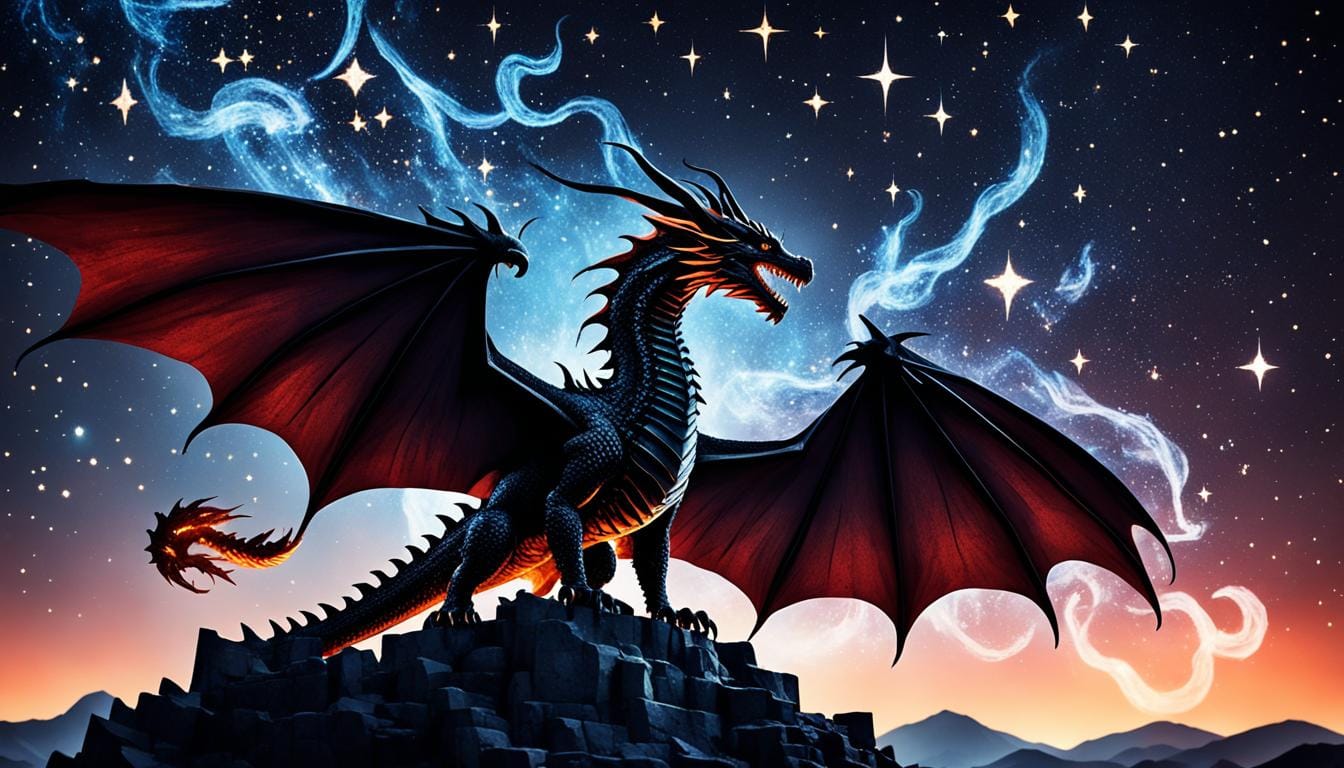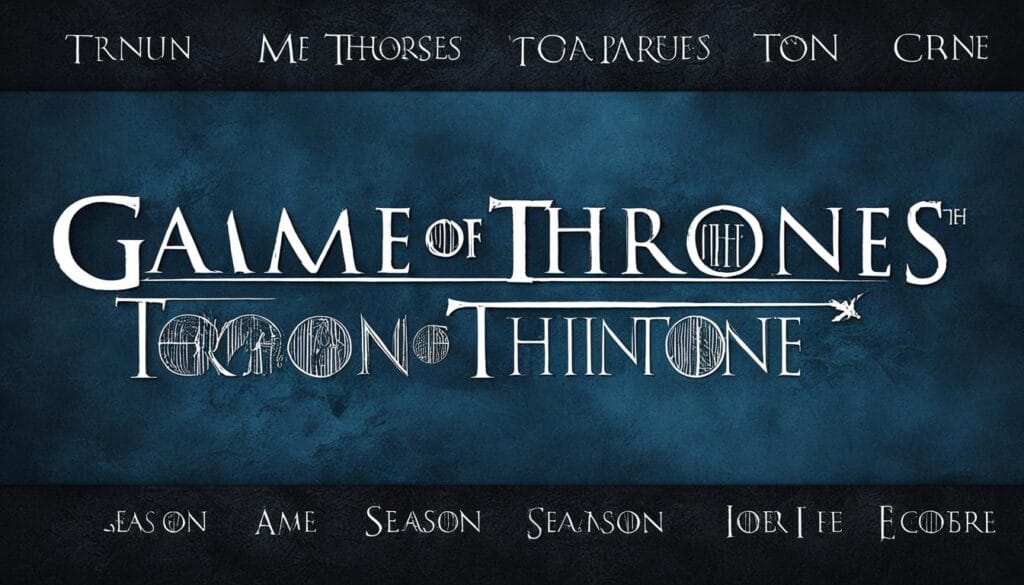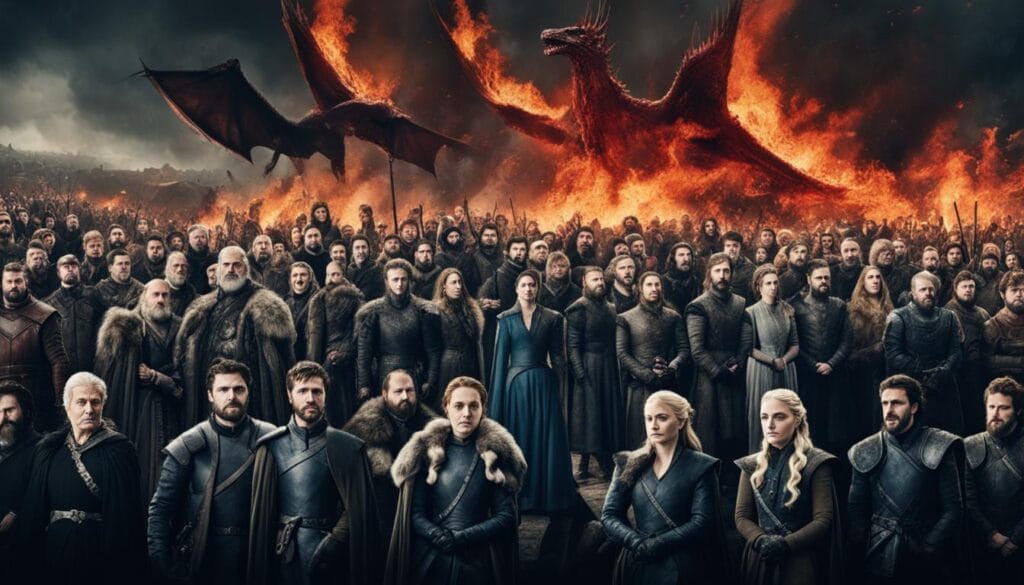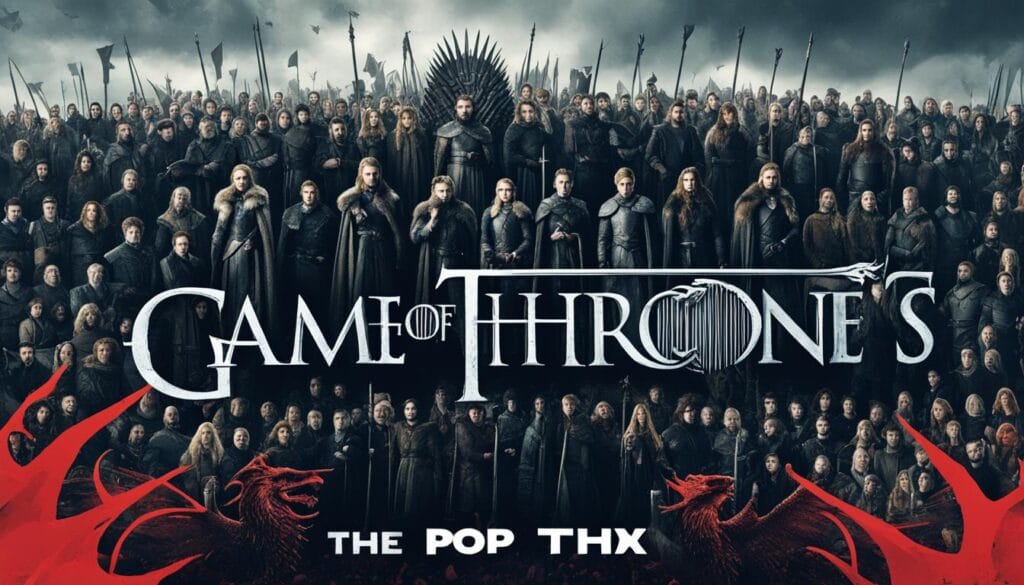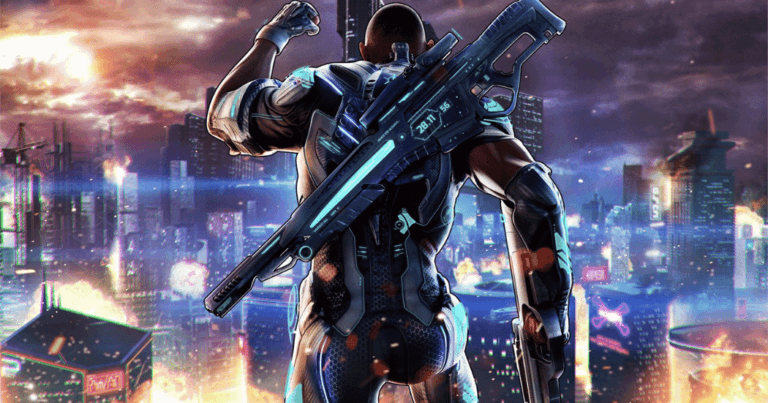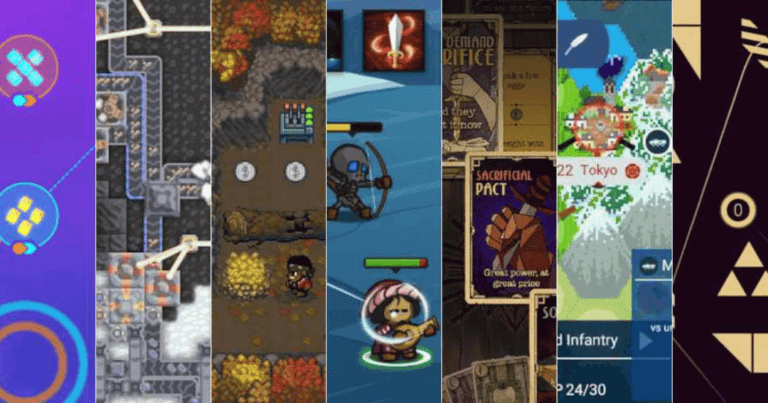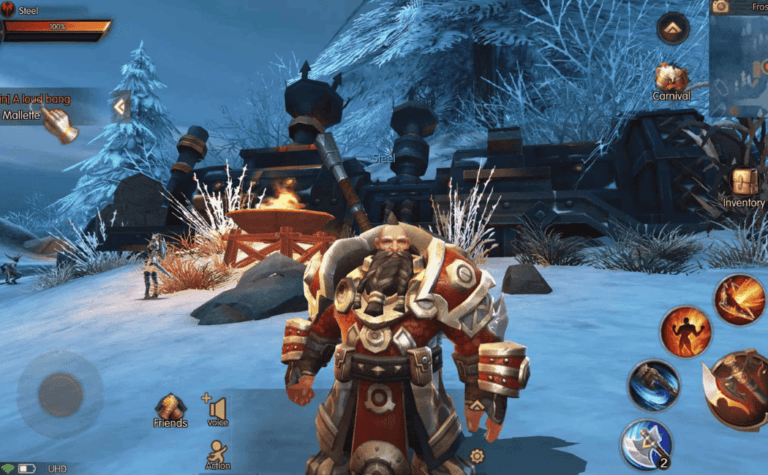Game of Thrones was a huge hit, pulling in millions. Critics and fans alike loved it. The show scored an impressive 89% on the Tomatometer and 85% with the audience. These scores tell us it’s a top-notch series. Game of Thrones Reviews.
People loved the earlier seasons. They were full of suspense, great characters, and amazing stories. But, as the show went on, some viewers felt it lost its way. The final season, in particular, divided the audience. It left some fans wanting more.
Key Takeaways
- Highly rated with an average Tomatometer score of 89%.
- Audience Score stands at 85% from over 50,000 ratings.
- Seasons 1 through 7 maintained high ratings between 90% and 97%.
- Season 8 received a significantly lower rating of 55%.
- The show was celebrated for its suspense, character development, and plot.
Overall Ratings and Popularity
Game of Thrones became hugely popular for its complex story and amazing visuals. It went from cheers to a controversial finish, drawing in people from around the globe.
Initial Reception and Acclaim
From the start, Game of Thrones was hailed as a TV masterpiece by many. Nearly 939 out of 1,029 early reviewers said this praise was super helpful.
Its mix of suspense, deep characters, and complex plots often placed it at the top of “best TV shows” rankings.
Viewership Statistics Over the Seasons
Until its seventh season, Game of Thrones’ audience kept growing. But then, the final season wasn’t as loved by viewers. Below is a summary of viewership trends:
| Season | User Ratings | Critical Reception |
|---|---|---|
| 1-6 | 4.5 – 5 stars | Near-universal acclaim |
| 7 | 4.2 stars | Mixed to positive |
| 8 | 3.0 stars | Mixed to negative |
Critical Acclaim vs. Fan Reception
Many critics initially praised Game of Thrones for its deep story and high production quality. Yet, fans grew more critical of its ending. Around 3,235 out of 3,587 people found the post-season 6 drop in quality helpful to know.
Also, 1,116 out of 1,265 fans felt a remake of the final season was the way to fix its perceived flaws.
This divide between critics and fans points out a big split. Some feel that the final episodes didn’t match the series’ usual brilliance.
How Did Jon Snow’s Character Evolution Define Game of Thrones?
Jon Snow’s Journey from Bastard to Leader
Jon Snow’s transformation from the ostracized bastard of Winterfell to a pivotal leader in Westeros stands as one of Game of Thrones’ most compelling character progressions. His journey began with a profound sense of displacement within the Stark household, pushing him toward the Night’s Watch as his only path to honor. Within this ancient order, Jon’s inherent leadership qualities gradually emerged as he navigated increasingly complex moral territory. His time beyond the Wall with the wildlings fundamentally altered his worldview, allowing him to see beyond the rigid structures and ancient prejudices that dominated Seven Kingdoms politics. This perspective proved crucial when he later became Lord Commander of the Night’s Watch, making the controversial decision to ally with former enemies against the existential threat posed by the Night King and his army of the dead. Jon’s resurrection after his assassination represented a pivotal moment in the series, freeing him from his Night’s Watch vows and propelling him toward his role as King in the North. Throughout season 7, Jon’s leadership style—defined by principle rather than political expediency—contrasted sharply with the approaches of other power players in Westeros, particularly those in King’s Landing. His willingness to kneel to Daenerys Targaryen despite holding his own crown demonstrated his prioritization of survival over pride, a distinction that separated him from many leaders throughout the series. As his true parentage was revealed, connecting him to both House Stark and House Targaryen, Jon’s identity crisis reflected the series’ broader themes of belonging and legitimacy. Even in the controversial season 8, Jon’s consistent moral center—culminating in his tragic decision regarding Daenerys—maintained the character’s essential integrity established in the earlier seasons, even as other aspects of the narrative faced criticism from platforms like IGN.
Key Moments That Defined Jon Snow’s Character
Throughout Game of Thrones’ 7 seasons leading to its conclusion, Jon Snow’s character was shaped through pivotal moments that tested his values and expanded his understanding of leadership. His execution of Janos Slynt in season 5 marked his evolution from reluctant leader to one willing to enforce necessary justice, echoing Ned Stark’s lessons about the man who passes sentence swinging the sword. The Battle of the Bastards represented Jon’s emotional vulnerability, as his tactical planning collapsed when Ramsay Bolton manipulated him through Rickon’s death, demonstrating how Jon’s compassion could be both strength and weakness. His confrontation with the Night King at Hardhome revealed the existential stakes beyond Westeros’ political conflicts, cementing Jon’s focus on the threat beyond the Wall rather than the game of thrones in King’s Landing. When Jon returned to Winterfell and reunited with Sansa, their relationship illustrated his growth from the boy who once felt excluded to a man embracing his Stark identity despite his bastard status. Season 7’s revelation of Jon’s legitimate Targaryen heritage created a profound identity crisis,
Season-by-Season Breakdown
The Game of Thrones series has kept fans worldwide glued to their screens. Each season weaves a complex tale that draws viewers in. Let’s dive into every season’s highs and lows.
Season 1: Setting the Scene
Season 1 takes us into the vast, brutal world of Westeros. It introduces us to characters and power struggles with sex, nudity, and violence. The story unfolds through political webs, leading to a thrilling finale. While it lacks big battles due to a small budget, it hooks viewers from episode five.
Season 2: The Rise of Power Struggles
Building on Season 1, the second season deepens power dynamics and battles for King’s Landing. Characters evolve, revealing their true intentions. The season ends with a spectacular wrap-up, earning high praises in Game of Thrones reviews.
Season 3: Iconic Moments and Twists
Season 3 stands out with its iconic scenes and dramatic plot twists. It shines with fan-favorite characters and the unforgettable “Red Wedding.” Bad guys sometimes win, making the story unpredictable. Despite fewer battles, the tension and drama are always high.
Seasons 4-6: Climax and Expanded Universe
The fourth season is praised for adapting the source material flawlessly. It sets the stage for a riveting storyline. Seasons 5 and 6 delve deep into character journeys but face pacing issues. The universe expands, drawing in more fans with its enriching storylines.
Seasons 7-8: The Decline in Quality
As the series nears its end, Seasons 7 and 8 face criticism for declining quality. Season 7 maintains a solid pace, but Season 8’s conclusion feels rushed. Several plot resolutions leave fans disappointed, dropping its critical acclaim.
| Season | Episodes | Highlights | Critiques |
|---|---|---|---|
| 1 | 10 | Cliffhanger finale, strong character introductions | Lack of budget for battle scenes |
| 2 | 10 | Intricate strategies, engaging final episodes | Some pacing issues |
| 3 | 10 | “Red Wedding”, strong character arcs | Less focus on battle scenes |
| 4 | 10 | Strong source material adaptation | — |
| 7 | 7 | Fast-paced storyline | Too short |
| 8 | 6 | Visual effects, cinematic scale | Rushed conclusion |
Plot and Character Development
Game of Thrones is known for its detailed plot and deep characters. Fans love how it combines complex stories with amazing character growth. This was especially true until season six.
Key Story Arcs and Their Impact
The storylines in Game of Thrones have really stuck with people. From House Stark’s rise and fall, to Daenerys’ journey, the show captured hearts. It’s packed with suspense and surprises, keeping fans eager to see more.
Character Evolution: Heroes and Villains
In reviews, critics praise the way characters like Arya, Tyrion, and Jaime changed. Their evolutions make it hard to tell who’s good or bad. By season six, this became a big reason why the show was so popular.
Unfinished Storylines and Plot Holes
Yet, the last seasons made some fans see the show differently. The final season was criticized for ending storylines too quickly. Many felt the conclusions were not satisfying. Some characters’ stories seemed waste away, upsetting many viewers. Over 1,000 fans even asked for season eight to be remade.
Visual and Production Quality
Game of Thrones has changed TV with its amazing visuals. It used a big budget and the latest tech. This made its scenes and battles stand out in reviews.
Scenes like the “Battle of the Bastards” wowed audiences with perfect moves and great effects. Even though the last season’s story got mixed reviews, many still hailed its looks.
Fans were thrilled with the Season One 4K Blu-ray. It comes with four region-free discs and a digital download. It also supports HDR10 and Dolby Vision for the best picture.
This set offers a lot, like audio tracks with cast comments and a ‘Making of’ video. It also has features on the show’s start and profiles of 15 characters. These extras offer more than just watching.
People love the 4K Blu-ray’s new look. The work on Season One is especially noted. It makes the series even better, say the best Game of Thrones reviews.
In the end, the show’s real stars are its top-notch visuals and careful planning. This is why it’s a TV classic, as top Game of Thrones reviews show.
Game of Thrones Reviews: Community and Fan Perspectives
“Game of Thrones” has a big fan base that loves to talk about it. People use Game of Thrones review website and Game of Thrones review blog to share their thoughts. This helps us see how much the show means to its fans.
Top Game of Thrones Review Website and Bloggers
Many blogs and websites help start conversations after episodes air. For example, the Washington Post writes episode reviews. These reviews discuss the story and characters, giving fans a place to chat about the show.
Fan Reactions to Major Plot Points
Fans had a lot of feelings about the big events in the show. For the Battle of Winterfell, some were amazed but others were not happy. The episode “The Long Night” had an epic battle but it was hard to see because it was too dark.
People were scared when the Dothraki charge didn’t go well. But, the deaths of important characters surprised some fans.
Some fans thought the show started to use more common fantasy ideas. This was different from the show’s usual surprises. Even though many were happy about Arya killing the Night King, some thought that part was not well explained.
Petitions and Calls for Remake
Many fans were disappointed with the last season. They wanted it to be done over. Some Game of Thrones review blogs talked about this, saying the ending should have been different. This shows how much fans care about the characters and stories they love.
The Ending and Its Controversy
The final episodes of Game of Thrones sparked a huge debate. Many fans and critics were not happy with the way the story ended. They found issues with the speed and the way major plots ended.
Why Season 8 Disappointed Many
The last season focused more on politics and deep talks. This was a big change from the early seasons’ tough moral choices. It made some fans feel like they lost the characters they loved.
Bran being chosen as the leader didn’t sit well with many. It seemed sudden and not well developed. This change made some fans feel like the story had left them behind.
Analysis of Key Ending Episodes
Some scenes in the last episodes were well liked. Tyrion Lannister’s speech about stories was a highlight. It talked about the importance of tales, reflecting on the show’s own legacy.
Yet, the show faced criticism for talking too much and acting too little. Making Bran the leader was also a point of contention. And, jokes about voting showed the show’s less advanced politics.
| Key Episode Elements | Fan Reaction |
|---|---|
| Tyrion’s Speech | Mixed—Appreciated for meta-commentary |
| Bran as King | Controversial—Disconnected character development |
| Samwell’s Proposal | Mixed—Viewed as satire |
| Resolution of Conflicts | Criticized—Preferring dialogue over action |
Alternative Endings Suggested by Fans
Fans came up with many different endings they thought would be better. They even started petitions asking for a new final season. Fans felt the story didn’t end in a way that did justice to the characters.
The ending scenes, like Jon Snow’s goodbyes, made fans very emotional. But the quick finish left many wanting more. This uproar led to fans suggesting their own, often better, ways the show could have ended.
This marked a major moment in the Game of Thrones ending controversy. Fans felt the conclusion was not enough for the journey they shared with the show.
Influence on Pop Culture
Game of Thrones has made a huge impact on pop culture. It changed modern TV and more in its nearly ten years on the air. With its deep stories, rich characters, and great look, it set a high bar for other fantasy shows.
Game of Thrones and Modern TV Landscape
Game of Thrones changed TV forever, leading to more big-budget shows. Series like The Witcher, His Dark Materials, and the Lord of the Rings series have tried to match its depth and beauty. Even with its end, HBO’s new House of the Dragon carries on its legacy through ten episodes.
Merchandising and Fan Art
More than just a show, Game of Thrones has created a wide range of things to buy. From board games to online games for up to six players, it’s everywhere. The board game by Fantasy Flight Games is particularly popular, combining strategy with the show’s world. Plus, fans globally make art and share their love for the series by drawing their favorite scenes or characters.
| Aspect | Game of Thrones | Impact |
|---|---|---|
| TV Budget Increase | Final season average: $15 million per episode | Marked rise in big-budget TV shows |
| New Fantasy Series | Several, including Outlander, The Magicians, The Witcher | Increased volume of fantasy content |
| Community Engagement | Strong fan reactions, petitions | Significant spike in spoiler culture awareness |
| Story Complexity in TV Shows | Multiple, intertwined plotlines | Encouraged more intricate narratives |
In the end, Game of Thrones remains key in culture and success. It changed how shows are made and how fans connect with stories. Its impact is clear in today’s entertainment world.
Comparison with Other Epic Series
When we talk about Game of Thrones, we must compare it to other top TV shows and epic stories. This helps us understand what makes it special and where it stands in epic storytelling.
How Game of Thrones Stacks Up Against Breaking Bad
Game of Thrones and Breaking Bad both shine for their deep plots and rich characters. Breaking Bad tells the story of Walter White’s change in a straight line. In early Game of Thrones, we see many key characters and stories. Both shows are loved for their surprises and tough choices.
But in comparing the two, a difference stands out. Breaking Bad kept its high quality all the way, but some fans felt Game of Thrones slipped in its last seasons. Adapting George R.R. Martin’s long books was hard for the makers. Critics pointed out this challenge.
The Unique Aspects of Game of Thrones
Game of Thrones stands out for its huge, detailed world. Created from George R.R. Martin’s long books, it has many characters and places. It offers something unique with its dragons, battles, and complex politics. Unlike Breaking Bad, it covers themes like power struggles and loyalty through many seasons.
Game of Thrones vs. The Lord of the Rings
Game of Thrones comparison often brings up The Lord of the Rings. Both are known for detailed worlds and combining fantasy with real struggles. The key difference is The Lord of the Rings’ singular quest against Game of Thrones’ many intertwined stories.
Another difference is in theme. While Tolkien often shows clear right and wrong, Martin explores lots of grey areas in Game of Thrones. This includes complex politics and themes suited for adults. Such complexities link Game of Thrones more to real historical events, giving it a unique spot in the epic series genre.
| Aspect | Game of Thrones | The Lord of the Rings |
|---|---|---|
| Narrative Style | Multiple POVs & Storylines | Linear, Singular Quest |
| Key Themes | Power, Betrayal, Survival | Good vs. Evil, Fellowship |
| Fantastical Elements | Dragons, Political Intrigue | Mythical Creatures, Epic Battles |
Memorable Episodes and Scenes
Game of Thrones shocked and pleased fans for years. It won 161 awards and holds a Metacritic score of 86. The episodes “Battle of the Bastards” and “The Rains of Castamere” stand out. They show why the series is so highly regarded. Let’s review some amazing Game of Thrones episodes. These include the scenes that made viewers want more.
Battle of the Bastards
“Battle of the Bastards” is a fan favorite. It features Jon Snow battling Ramsay Bolton. The fight is large and well-choreographed. It uses extensive extras and CGI. This effort by the producers is a big reason for the episode’s acclaim.
Red Wedding and Its Impact
The “Red Wedding” in “The Rains of Castamere” shocked everyone. It showed the brutal side of the chase for power in Westeros. George R. R. Martin’s bold storytelling choices in this scene left a lasting mark. It’s one of the most discussed scenes in the show.
Greatest Character Moments
Major characters like Arya, Tyrion, and Daenerys had standout moments. Arya’s transformation into a killer and her battle with the Night King was memorable. Tyrion’s speeches and Daenerys’ powerful scenes also stick with viewers.
For an in-depth look at these moments, check out this Metacritic article. It dives into the show’s most remarkable episodes and scenes. The critical acclaim shows why these episodes are considered some of the best in television.
Game of Thrones: Complete Series Review and Analysis
HBO’s epic fantasy series Game of Thrones captivated global audiences from 2011 to 2019, adapting George R.R. Martin’s “A Song of Ice and Fire” novels into what many consider the best TV production of the decade. From the frozen landscapes of Winterfell to the Mediterranean beauty of King’s Landing, viewers were immersed in the complex political machinations, shocking plot twists, and character development that defined the world of Westeros. This comprehensive review examines the show’s incredible rise, its controversial conclusion, and the lasting impact it has had on television history, incorporating critical perspectives from platforms like IMDb and IGN.
How Did Game of Thrones Change Television Forever?
The Cultural Impact of Game of Thrones on Modern Entertainment
Game of Thrones transformed television by establishing a new benchmark for what ambitious storytelling could achieve. Prior to its arrival, fantasy was rarely considered prestige television, but the show’s intricate plotting, morally complex characters, and willingness to subvert expectations through shocking plot twists changed industry perceptions entirely. The cultural conversations surrounding Westeros extended far beyond typical fan discussions, with water cooler moments like the Red Wedding or the battle between Jon Snow and the Night King generating social media storms that transcended typical viewership metrics. Characters like Arya Stark became feminist icons, while the political machinations of King’s Landing inspired academic analyses comparing the series to historical events. George R.R. Martin’s source material provided rich foundations, but the show’s execution elevated fantasy storytelling to unprecedented mainstream relevance, demonstrating that complex, adult-oriented genre fiction could achieve both critical acclaim and commercial success. The show’s earlier seasons particularly demonstrated how methodical character development and world-building could create an immersive experience that kept viewers returning week after week, season after season.
HBO’s Risk-Taking Strategy with Game of Thrones
HBO’s monumental gamble on Game of Thrones represented one of television’s boldest financial and creative commitments. The network invested unprecedented resources in bringing Westeros to life, with budgets for individual episodes in the later seasons exceeding what many feature films receive. This risk-taking approach paid remarkable dividends as the show transformed from an ambitious experiment into a global phenomenon across 7 seasons. HBO recognized that George R.R. Martin’s intricate source material demanded faithful treatment and proper resources to capture the political intrigue of King’s Landing and the vast landscapes stretching from Winterfell to beyond the Wall. The network’s willingness to support shocking plot twists, including the deaths of seemingly untouchable main characters, helped establish Game of Thrones as the best TV experience of its era. While seasons 5 and 6 began showing signs of creative tension as the series outpaced Martin’s published novels, HBO’s commitment never wavered. The network’s patience with the show’s elaborate production schedules—including the extensive location shoots required to create authentic Westeros environments—set new standards for television production. IGN and other industry observers frequently noted that HBO’s willingness to invest in quality over immediate profit helped transform both the network’s reputation and television’s creative possibilities.
From Book to Screen: Adaptation Challenges and Successes
Translating George R.R. Martin’s sprawling novels to television presented enormous challenges that the production team navigated with varying degrees of success throughout the series. The earlier seasons demonstrated remarkable fidelity to the source material, capturing the political intrigue of King’s Landing and the harsh realities of life in Westeros with nuanced character development and measured pacing. Showrunners David Benioff and D.B. Weiss initially excelled at condensing Martin’s expansive narrative while preserving its essence, particularly in how they handled complex character arcs for figures like Jon Snow, Arya Stark, and the Lannister siblings. However, as the series progressed beyond Martin’s published works in seasons 5 and 6, noticeable changes in storytelling approach emerged. The adaptation faced its greatest tests in season 7 and the controversial season 8, when the absence of complete source material became increasingly apparent. The Night King, a creation primarily developed for television rather than directly from Martin’s books, exemplified how the show sometimes diverged from its literary foundations to streamline narrative elements for visual storytelling. Critics from platforms like IGN frequently noted these adaptational shifts, particularly how plot twists and character motivations sometimes felt more designed for televisual impact than organic storytelling in later seasons. Nevertheless, even with these challenges, the adaptation succeeded in bringing Westeros to life in ways that expanded the books’ already substantial fanbase and created a cultural phenomenon that transcended its literary origins.
What Made Game of Thrones Season 7 a Turning Point in the Series?
Key Character Developments in Season 7
Season 7 marked a significant evolutionary phase for many of the show’s central characters, with particularly dramatic developments for Jon Snow as he transitioned from King in the North to pledging allegiance to Daenerys Targaryen. This season crystallized Jon’s true heritage as the legitimate son of Rhaegar Targaryen and Lyanna Stark, fundamentally altering his position within the power dynamics of Westeros. Meanwhile, Arya Stark’s return to Winterfell showcased her completed transformation from helpless child to deadly assassin, culminating in her methodical elimination of the entire Frey house to avenge the Red Wedding. In King’s Landing, Cersei Lannister’s character arc took its darkest turn as she consolidated power through increasingly ruthless means, abandoning any remaining moral constraints that had previously humanized her character. Season 7 also brought Daenerys Targaryen to Westeros after six seasons of buildup, testing her leadership approach against the political realities of the continent she sought to rule. The Night King emerged as an existential threat that forced former enemies to consider cooperation, altering character motivations and relationships established in earlier seasons. Critics from IGN and other platforms noted that while these developments accelerated character arcs compared to the more measured progression of seasons 5 and 6, they created compelling new dynamics that set up the series’ conclusion. The shortened season meant less room for nuanced character exploration, but pivotal moments like Jon’s encounter with Drogon and the emotional Stark family reunions at Winterfell delivered meaningful progression that resonated with audiences despite the accelerated pacing.
Accelerated Pacing and Its Impact on Storytelling
Season 7 marked a dramatic shift from the methodical storytelling approach of earlier seasons to a considerably faster narrative pace that polarized longtime viewers. Where the show had previously dedicated entire seasons to gradually developing plot points across Westeros, season 7 compressed significant story events into just seven episodes. This acceleration resulted in characters traversing vast distances across the continent with unprecedented speed, most notably when Jon Snow and his companions ventured beyond the Wall and received timely rescue from Daenerys at Eastwatch. The narrative compression meant that political machinations in King’s Landing that might have unfolded over multiple episodes in earlier seasons were now resolved within single installments. Critics at IGN and other publications noted that while this pacing created more frequent high-stakes moments and spectacular set pieces, it sometimes came at the expense of the nuanced character development that had distinguished the show’s earlier seasons. The rapid progression from the dramatic destruction of the Great Sept of Baelor at the end of season 6 to the preparation for the Great War against the Night King meant that character motivations sometimes felt determined more by plot necessity than organic evolution. Travel time between Winterfell and King’s Landing, which had previously established the vast scale of Westeros, suddenly compressed in service of bringing key characters together more quickly. This accelerated approach created a noticeable contrast with George R.R. Martin’s methodical source material and signaled the show’s shift toward prioritizing resolution over exploration as it moved toward its conclusion.
Critical Reception of Season 7 on IMDb and IGN
Season 7’s reception among critics and fans revealed the growing divide in perceptions of Game of Thrones’ evolving approach to storytelling. On IMDb, the season maintained impressive ratings, with episodes like “The Spoils of War” featuring Daenerys’ dragon attack on the Lannister forces earning near-perfect scores from viewers impressed by the spectacular battle sequences and long-awaited character meetings. IGN’s comprehensive reviews acknowledged the technical achievements while raising concerns about narrative shortcuts, particularly regarding the expedition beyond the Wall and the somewhat contrived tensions between Arya and Sansa at Winterfell. Critics praised the production values that brought Westeros to life more vividly than ever, with the loot train attack showcasing unprecedented integration of dragons into battlefield choreography. However, many reviews noted that the abbreviated season structure forced plot developments that the earlier seasons might have explored over twice as many episodes. The Night King’s acquisition of a dragon—a moment with profound implications for the existential threat facing Westeros—received mixed responses for its dramatic impact versus its somewhat convenient narrative function. While season 7 remained highly rated overall on aggregator sites, the critical discourse increasingly focused on whether the series was sacrificing the methodical character development of its first 5 and 6 seasons in favor of spectacle and resolution. Despite these concerns, most reviews acknowledged that even with accelerated pacing, Game of Thrones remained among the best TV productions on air, with technical elements and performances consistently exceeding television standards.
Why Was Game of Thrones Season 8 So Controversial Among Fans and Critics?
Character Arc Conclusions: Expectations vs. Reality
Season 8 delivered some of the most contentious character conclusions in television history, with fan expectations dramatically colliding with the creative choices made by the showrunners. Perhaps no character arc proved more divisive than Daenerys Targaryen’s rapid transition from liberator to destroyer, culminating in her devastating attack on King’s Landing despite the city’s surrender. This development, while foreshadowed in earlier seasons, felt rushed to many viewers who had invested in her journey across 7 seasons. Similarly, Jaime Lannister’s return to Cersei after his redemptive arc struck many as contradicting years of carefully constructed character development. Jon Snow’s fate—being exiled to the Night’s Watch after killing Daenerys—generated heated debate, with many feeling his true heritage as Aegon Targaryen was rendered ultimately inconsequential to the power structure of Westeros. Arya’s abandonment of her kill list to become an explorer and Bran’s elevation to king despite his disconnect from humanity represented outcomes few had anticipated. The Night King’s defeat in “The Long Night” particularly divided audiences, with his elimination coming before many of the mysteries surrounding his character had been fully explored. IGN reviews and IMDb user ratings reflected this division, with technical elements receiving continued praise while narrative choices faced intense scrutiny. The controversy stemmed largely from the perception that character arcs built meticulously through the earlier seasons were concluded with insufficient development or unsatisfying resolutions that prioritized shock value over narrative consistency with the established character trajectories in Westeros.
Analysis of Season 8’s Writing and Narrative Choices
The writing decisions that shaped season 8 represented a marked departure from the storytelling approaches that had defined Game of Thrones during its rise to cultural prominence. Critics from IGN and numerous other outlets noted that without George R.R. Martin’s complete source material to guide the narrative, the final season appeared to prioritize spectacle and surprise over the character-driven complexity that had distinguished earlier seasons. The Battle of Winterfell against the Night King—while visually stunning—resolved the existential threat that had loomed since the series premiere with relatively few major character casualties, undermining the show’s established willingness to embrace realistic consequences. Plot developments in King’s Landing occurred at unprecedented speed, with Euron Greyjoy’s fleet demonstrating suddenly deadly accuracy against dragons, only to become ineffective when the narrative required Daenerys to triumph. The controversial decision to have Bran Stark become ruler of Westeros despite his minimal leadership experience or political engagement throughout the series exemplified how season 8’s narrative choices sometimes prioritized thematic resonance over character logic established across the previous 7 seasons. Perhaps most critically discussed was how the density of plot developments in just six episodes prevented the kind of gradual character evolution that had made earlier twists like the Red Wedding feel earned despite their shock value. This compressed approach meant that pivotal moments like Daenerys’s decision to destroy King’s Landing or Jaime’s return to Cersei lacked the extensive build-up that similar character turns had received in the show’s prime seasons. While the production values of Westeros remained unparalleled, the writing choices in season 8 created a disconnect between the show’s conclusions and the narrative foundations established in its critically acclaimed earlier seasons.
The Legacy of Game of Thrones After Its Finale
Despite the controversial reception of season 8, Game of Thrones’ overarching legacy as transformative television remains largely intact. The series fundamentally altered production expectations for the medium, demonstrating that audiences would embrace complex, morally ambiguous narratives with production values previously reserved for feature films. The continuing influence of Westeros can be seen in HBO’s substantial investment in spin-off series like “House of the Dragon” and the wave of high-budget fantasy adaptations that emerged in its wake. While IGN reviews and IMDb ratings reflect significant disappointment with the final season, they haven’t erased the show’s historical importance in television’s evolution. The earlier seasons continue to be referenced as masterclasses in adaptation, character development, and subverting audience expectations through organic plot twists rather than mere shock value. Jon Snow’s journey from bastard to leader, despite its controversial conclusion, remains one of television’s most memorable character arcs. The cultural conversations surrounding King’s Landing politics, the Night King’s threat, and character fates demonstrate how deeply the series penetrated popular consciousness. The divisive nature of season 8 has created a complex legacy where critics acknowledge both the unprecedented achievements of the series and its ultimately unfulfilled potential. Perhaps most significantly, the controversy itself speaks to how emotionally invested audiences became in Westeros and its inhabitants—a testament to the world-building and character development that defined the show at its peak across 7 seasons. Game of Thrones may have faltered in its final hours, but its position as one of the most ambitious and influential television productions remains secure.
Conclusion
Our detailed look into Game of Thrones shows it dramatically impacted TV. It maintained top quality for six seasons. These were full of detailed stories, deep characters, and strong emotions. Fans and critics see this time as a peak.
Sadly, the series lost its way in the last two seasons. Season 7 was still good, getting an 8/10. But viewers noticed the story was moving too fast and had issues. The biggest letdown was Season 8, only earning a 2/10. Many wished the show’s end was different.
Even with flaws in its finale, Game of Thrones stays a landmark in TV. It brought rich characters, high production, and complex plots to the table. This solidified its place as one of the best shows ever. Although its ending divided fans, it continues to spark conversations and shape popular culture.



